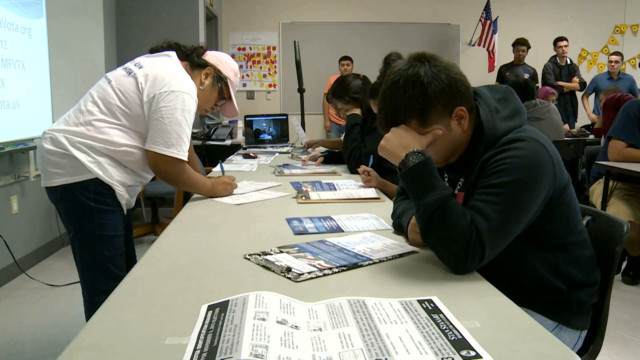The number of people approved to become American citizens has skyrocketed, with applications up 32 percent over the past quarter.
Many of these immigrants say it’s because they hope to be citizens in time to vote in the 2016 presidential election. On The Heat, we examine the rising immigrant vote in the United States.
CCTV America’s Jessica Stone reports from Houston, Texas.

A September report by the nonprofit National Partnership for New Americans has found that since last September, 928,713 people have applied to become U.S. citizens, representing a 25 percent increase.
In the past quarter alone, there’s been a 32 percent uptick in applications, the organization found.
However many hopeful citizens are also dealing with a United States Immigration and Citizenship Services backlog of 524,014 pending naturalization applications. The organization said USICS should have anticipated the surge and increased staffing.
“This cycle in 2016 is completely different than 2012,” said Texas State Director of Mi Familia Vota Carlos Duarte. “The level of interest in Latino community has grown exponentially.”
Number and country of origin of people obtaining legal permanent resident status in the U.S. in 2013
Expert panel on the rise of the immigrant vote
Joining the heat is a panel of experts to talk about what’s at stake for new immigrants in the upcoming election. Democratic candidate Hillary Clinton is trying to attract Hispanic voters as well as other immigrant groups. Clinton favors a path to citizenship for the millions of undocumented people already living in the United States. Meanwhile, her opponent Donald Trump has often held a tough stance on immigration.
* David Lee, executive director of the Chinese American Voters Committee and a political science professor at San Francisco State University.
* Imam Talib Shareef, president of the historic “Nation’s Mosque”, Masjid Muhammad, in Washington D.C.
* George Lujan, communications organizer with the Southwest Organizing Project in Albuquerque, New Mexico.
* Thomas Holbrook, department chair and a professor of political science at the University of Wisconsin-Milwaukee.

The panel continues.

 CGTN America
CGTN America
